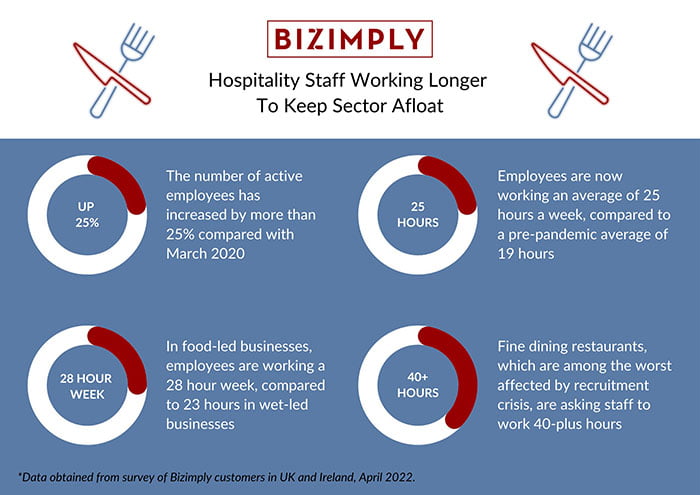Hospitality employees are working around six hours a week longer than before the pandemic, exclusive new figures from workforce management specialist Bizimply reveal.
As the hospitality sector works to tackle the unprecedented recruitment crisis, analysis of real-time data from Bizimply’s customers shows the practical steps operators are taking in order to deliver on customer expectation of service levels.
Taking March 2020 as the baseline, the data shows:
- Employees are now working an average of around 25 hours a week, compared to a pre-pandemic average of 19 hours a week;
- In food-led businesses, employees are working an average 28 hour week, compared to around 23 hours in wet-led businesses;
- Fine dining restaurants, which are among the worst affected by recruitment issues, are typically asking their staff to work 40-plus hours a week. Cafés and hotels are also seeing staff notch up longer than average weekly hours at work.
The figures are based on user data from hundreds of Bizimply customers in the UK and Ireland, equating to thousands of outlets and tens of thousands of employees, across all sectors of the hospitality industry including pubs, bars, restaurants, hotels, cafés and fast food outlets.
Bizimply warns that employers who are currently banking on the goodwill of their staff to keep their doors open to customers need to be ready to pay back that commitment in terms of improved pay and conditions, and a better work-life balance.
Bizimply CEO Conor Shaw said: “Most operators have significant numbers of part-time employees, such as students or those juggling work with childcare commitments, so we expect to see the average hours worked to be below the typical full-time tally of around 35 hours.
“However, it’s clear that in food-led sectors, particularly more premium venues such as fine dining and hotels, the recruitment challenge is particularly acute. With experienced chefs and front-of-house staff in very short supply, operators are asking staff to put in longer shifts than ever.”
The Bizimply figures are an insight into the extra commitment hospitality employees are making, While the average 25 hours a week mark was seen as a peak in the graph during the ’eat out to help out’ promotion in summer 2020 and then again at the end of December 2021 for Christmas and New Year, the average is now steady at the 25 hour level.
This means employers are asking existing staff to put in extra time in order to deal with the acute labour shortage, which is affecting hospitality along with many other sectors of the UK economy.
Within Bizimply’s customer base, the number of active employees – those regularly undertaking shifts – has increased by more than 25% compared with March 2020. Overall, ONS figures show the labour pool is smaller, as some older staff have not come back into the workforce post-pandemic, while significant number of experienced hospitality staff have also returned to the EU.
Shaw explains: “The figures showing more active employees than ever suggests there are winners and losers amongst operators in the battle to recruit the best staff.
“The fact that employers using our workforce management system have increased their teams suggests that flexibility is an important factor for employees. Our scheduling tools mean employers can easily offer team members flexibility and that can make all the difference in this seller’s market for employees with the right skills.
“Of course, employers are also having to invest in improving pay, with upward pressure on wages at all levels, but it’s not just about the money. A student who wants extra time off in the run-up to exams, or a parent who needs their shift pattern to accommodate school holidays, will go with the employer who has systems in place to accommodate their needs.”
Bizimply’s software is designed to help hospitality businesses reduce time spent on staff rosters and payroll and free up front-line staff, particularly GMs.
Bizimply estimates GMs can spend up to six hours a week creating a staff rota using Excel or similar. Equipping them with the right software to produce rotas and payroll quickly gives this time back. Making the task of drawing up rotas simple means it’s done in good time, enabling staff to be given plenty of notice of shifts.
Shaw sums up: “The balance of power has shifted in hospitality, and employees hold more of the cards. Employers will need to meet their staff’s expectation in terms of work-life balance as a quid pro quo for the extra commitment.”
